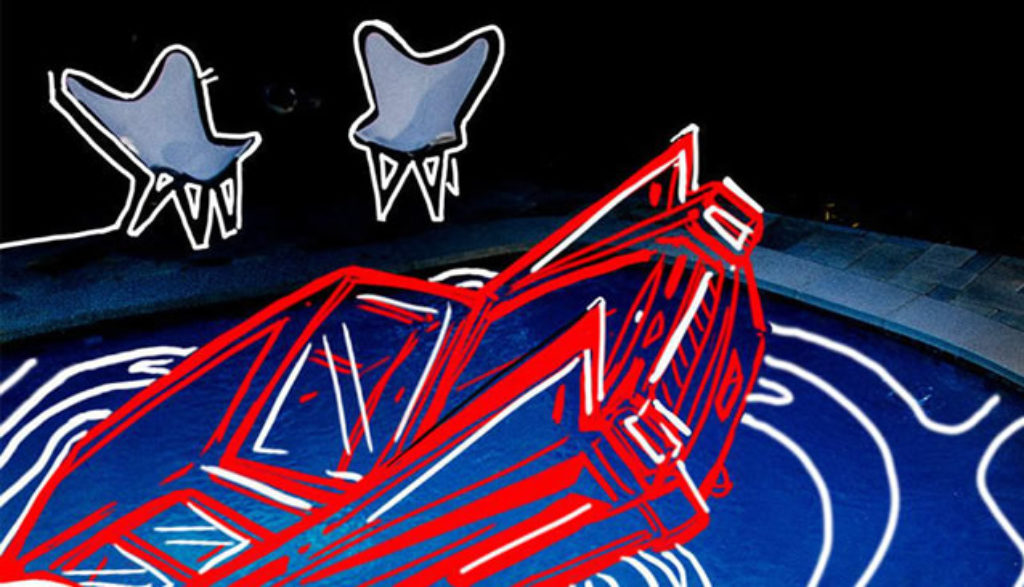
And then there was one. One member left in Panic! at the Disco: Brendon Urie.
Panic! indeed. (Is that why he put the exclamation point back in the name?)
But it turns out Urie’s not panicking at all after everyone else in his band decided to call it a day. Instead, Urie’s reveling in complete creative control of his one-man band. The result? A typically frenetic Panic! album that once again melds all manner of musical influences. This time, Urie’s tipped his hat strongly in the direction of … wait for it … Frank Sinatra, with a big dose of Queen-like vocals and guitars added into his standard mix of emo-meets-pop-punk flourishes.
Urie also says getting married in 2013 has shaped not only his life but the lyrical trajectory of the project—which is more than hinted at in its title, Death of a Bachelor. “This whole album was written at my house where [Sarah] and I live, and it reflects very much the lifestyle I was living [while writing it], which is so different from who I used to be,” he told Entertainment Tonight.
And yet …
The album cover depicts Urie unconscious and naked (his groin obscured) on the roof of a house. It’s an image that will make you seriously question just how much marriage has really changed this last man standing.
As will his songs.
There’s still a lot of lyrical nostalgia lurking under that cover for wild nights when mind-altering substances regularly collided concussively with Urie’s brain. “I like writing about parties, so a lot of this stuff is about parties that I’ve gone to where I’m trying to recall exactly what happened—kind of in a hangover sense, trying to piece sense together and put it in a song.”
At least the title track pays lip service to the idea that giving up bachelorhood was no great sacrifice in exchange for the joys of marriage (“Seems so fitting for/Happily ever after/How could I ask for more?/A lifetime of laughter/At the expense of the death of a bachelor”). On “House of Memories,” a song about an old flame, Urie begins to express regret for how his previous sexual experiences have shaped him in unwanted ways (“Those thoughts of/Past lovers/They’ll always haunt me”).
“Hallelujah” is a complex song implying that getting caught in an illicit sexual affair may have been a catalyst for self-examination (“My life started the day I got caught/Under the covers/With secondhand lovers/Oh, tied up in pretty young things/In a state of emergency/Who was I tryna be?”). Then again …
Other lines on “Hallelujah” don’t prompt much rejoicing as they rationalize poor choices (“I was drunk and it didn’t mean a thing”) and cherishing those carnal memories (“And you miss ’em like you miss no other”). Dancing at a wild party is compared to praising God (“A moment you’ll never remember/And a night you’ll never forget/Oh!/All you sinners stand up, sing hallelujah/ … And if you can’t stop shaking, lean back/Let it move right through you/Say your prayers”).
On “Victorious,” we hear lines about carousing and caressing, with hints of violence thrown in. “My touch is black and poisonous,” Urie sings ominously, “And nothing like my punch-drunk kiss/I know you need it, do you feel it?/Drink the water, drink the wine/Oh, we gotta turn up the crazy/Livin’ like a washed-up celebrity/Shootin’ fireworks like it’s the Fourth of July.” Obliquely violent imagery involves a guillotine, a “killer king,” sharks and bloody water.
“Don’t Threaten Me With a Good Time” finds Urie waking up nearly naked after an epic bender. And we hear of “5,000 people with designer drugs,” as well as references to cocaine, champagne, smoking and the possibility that someone might “pass out in a drain pipe.” There’s a nod to men wearing women’s clothing. “H—” is used 15 times. More memories of still other crazy soirees fill “L.A. Devotee” and “Golden Days.” Hedonism, narcissism and entitlement reign on “Emperor’s New Clothes” (“If it feels good, tastes good/It must be mine/ … I’m taking back the crown/I’m all dressed up and naked/I see what’s mine and take it”).
Marriage perhaps isn’t as great for Urie’s bride, whom he asks suggestively on “Death of a Bachelor,” “When you think of me, am I the best you ever had?/Share one more drink with me, smile even though you’re sad.” Meanwhile, “The Good, the Bad and the Dirty” ponders separation and sex.
“Crazy = Genius” defiantly (and obscenely) tries to put a positive spin on the artistic connection between those two traits (“If crazy equal genius/Then I’m a f—ing arsonist/I’m a rocket scientist”). Elsewhere, a woman observes that alcohol affects her but drugs don’t seem to impact her guy.
Though Brendon Urie insists that marriage has resulted in the death of all his bad bachelor habits, you’d be hard-pressed to prosecute that case based solely on his Death of a Bachelor lyrics. A handful of moments evince growing self-awareness about the destructiveness of habits he embraced before tying the knot. Much more often, though, he’s still happy hugging them tight.


After serving as an associate editor at NavPress’ Discipleship Journal and consulting editor for Current Thoughts and Trends, Adam now oversees the editing and publishing of Plugged In’s reviews as the site’s director. He and his wife, Jennifer, have three children. In their free time, the Holzes enjoy playing games, a variety of musical instruments, swimming and … watching movies.